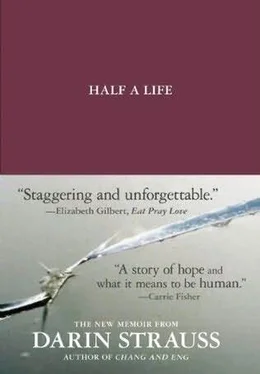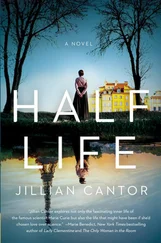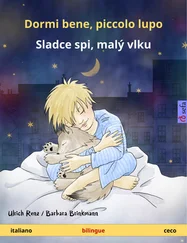“I don’t,” I told her, “blame you”—and realized I was quoting the Zilkes. I wondered if that was why I’d asked her: to have their words in my own mouth. The words, however, were untrue. I identified with Jacqueline — I wanted an easy life, as well — and stood watching her sullenly with clipped, cloudy wings. But I did blame her. And the words tasted unclean in my mouth.)
It’s as if there’s some pheromone of tact and sanctity given off by people whose suffering embarrasses others. Most of these women understood how and why I was behaving the way I did, before I had even behaved. And their sense of me, I realized, was dull and limited, but essentially accurate. (I’m not proud to admit that I found a way to shed the chafing habit of unwarranted sainthood: I broke up with these women.) Anyway, you see why I told so few people, and so rarely. It always ran conversation into the sand.
But I did have a somewhat normal and fun middle-twenties, or at least a multifaceted middle-twenties. And things had been happening in the world that anyone my age had to be at least faintly aware of: the United States had asked Iraq to step outside, then a Democrat came to occupy the White House for the first time since I was nine.
Mostly, I was trying to move on. Even though my thoughts did tend, still, to slip inward, to the incident that was the reference point for every sorrow that came my way. (“Happiness is the greatest hiding place for despair,” Kierkegaard once whimpered.) And I was very mindful that Celine didn’t have a fun or normal middle-twenties, or any middle-twenties at all.
When I was twenty-six, I somehow ended up on a first date at the movie I Know What You Did Last Summer . Which has at its crux a moment in which a teenager hits someone with his car. My breath went pinched.
I thought I was no longer the terrified kid who couldn’t think without visualizing Celine, who couldn’t visualize Celine without shaking. I thought the past could no longer vaporize my day-to-day life. But now I was having an animal response: I couldn’t watch.
“We have to get out of here,” I said. “Please.” This was about thirty minutes into the movie.
My date didn’t want to leave at first. I’d only just met her. But she’d seemed witty and spirited (if very pale), having crossed the lobby with her Christmas-ribbon smile and her good job in publishing. Now we slunk out of the theater.
Or, we were trying to: we had to stand up, block the screen for people who’d merely wanted a good scare. I was obstructing the fantasy with the real thing, though only I could understand that.
Once we got clear of the cineplex, I told her everything. The response was a stunner, out there on the sidewalk — a gruff note of grievance. Maybe I was mishearing; maybe this was her way of warming up toward being sweet and caressive.
“Christ, Darin, don’t you think of her sometimes?”
She shook her head, even though she was still smiling a bit. She whistled through her teeth. “Fuck.”
I turned out to be perfectly, officially wrong. This wasn’t caressive. This was pissed.
“It’s so goddamned selfish for you to feel bad for yourself,” she said, a hand at her pale forehead. “I’m not being rude.”
Wait a second, here. Of course I think of Celine sometimes.
“Yeah well, fine. But do you think about her enough ?”
Celine’s eyes getting teary after she tripped stealing third base in little league; Celine crackling over pebbles on roller-skates. Celine not being able to stay awake to the end of The Wizard of Oz as a kid. Her father (as Celine got dressed for her first date) singing a goofy, made-up song from her infancy. Sixth-grade Celine getting sick to her stomach on doctor’s-office candy after a flu shot. These brain montages were how I saw her — and often still see her. Aches and TV shows, family memories. Other times I construct the life she would’ve gone on to have: Celine wearing a long good coat, in her kitchen, flipping through envelopes to find a med-school acceptance letter. (This is a patently middle-class swirl of images, but I can’t deny who I am; I can’t unsee what I see. My pictures of a happy life are, intractably, those of ambition cultivated and rewarded.) Sometimes this story line includes rash, dangerous romances, nice solid domestic contentment, shattering health problems: everything, anything but nonexistence.
Or actually, everything and anything but the real Celine. My date, in her way, had been right. My mind was unrelentingly narrative: I imagined the loss of possibility, of chapters, scenes, minutes, of events and kisses and steam escaping the radiator behind Celine and her husband’s bed, with their kids in another room. I could feel what I felt about the loss of that. I even allowed myself to imagine her father. Alone at the kitchen table, lights off, not a voice in the house, passing a bottle of something square, bracing, and amber from hand to hand: a movie cliché flickering within the perimeters of recognizable devastation. But I was never brave enough to picture the one thing I knew to be true — Celine lying in the grass on the median strip, her eyes staring only a couple inches above her face, the last bit of time she ever saw.
“It’s okay that you called Mr. Zilke a prince, Dad,” I had ended up telling my father that morning of my first hearing.
“I just didn’t know how to react,” Dad had said. “Because even with the lawsuit and the suing for millions and, let’s be frank, a broken promise, I still empathize a lot with their family.”
“How much thinking about it would be enough?” I was saying to the date now, in front of the cineplex. “What’s the amount you’re looking for?”
“Okay,” the date said, and laughed.
She had a cheerful, almost childish voice — a voice I’d come to hear often in publishing meetings, a first-day-of-schoolish excitement and forthrightness. New subjects, new students every semester.
“How can you even go on living?” said the date.
Whoa. I buckled a little and went: “Um.”
And like that, Celine was here too, right with me the way her mother had wanted. She was saying: Yeah, I want to hear the answer to this .
Anyway, pretty quick, in my mind, I got really sharp: unruffled in James Bond tux, letting drop an epic retort while laying down beaucoup eight balls at the baccarat table on some island somewhere. I put up my mental dukes; I was all ready to give the date my best.
“I don’t know. I just, well.” And then I coughed up: “Uh”—a kind of vocal grimace.
“Yeah,” she said in her wronged voice, “that’s what I thought.” Who was this person with her Kleenex skin and her internship and that smile and did she kick puppies for fun?
“You have no idea how much I have thought about it,” I said, prim and soggy.
“And so you think, what, Oh, why did this happen to poor me? Why can’t I go to a movie all these years later? Hark unto this sad story about me .”
Her crossed arms told me that the conversation was over. But there was a cold playfulness to her face, the kind you’d see in a kid who has just gulped down, in front of a hungry sibling, the last cupcake at the party. I stood under the theater’s electric red tickertape, movies going around over my head like a thought bubble: I KNOW WHAT YOU DID … THE DEVIL’S ADVOCATE … MOST WANTED … EVENT HORIZON … A LIFE LESS ORDINARY … THE ICE STORM … I KNOW WHAT YOU DID …
I probably looked tearfree and sturdy, and I finally left for the subway without walking her home. “Okay, then,” is all I said to her, more preset civility than real goodbye. And the question I’d asked myself right after the accident had yet to be answered, after eight years: Would I ever get over this? (I know how this must read — my being focused on my own emotions right as she accused me of being self-absorbed — and I don’t defend it.)
Читать дальше









